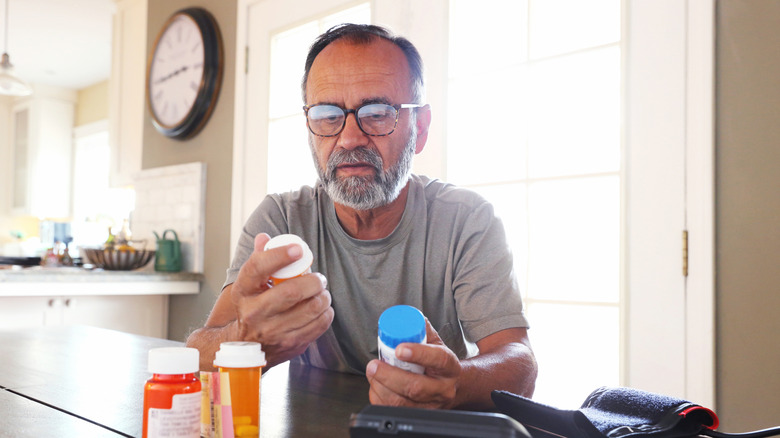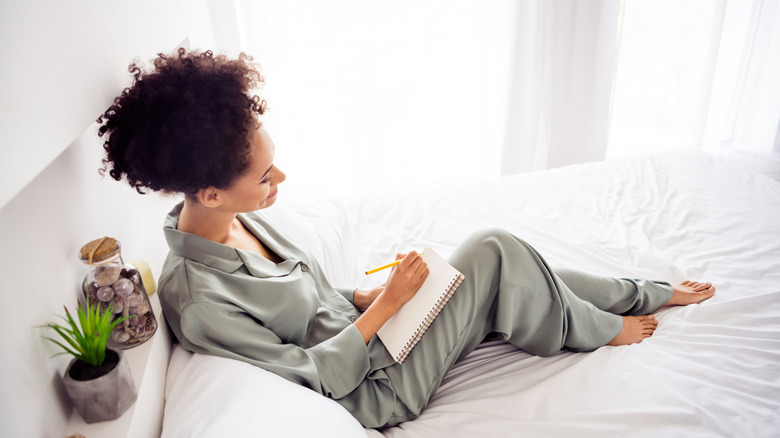A Popular Over-The-Counter Sleep Aid Could Increase Your Risk Of Dementia
Everyone struggles with sleep issues from time to time. Sometimes, the cause is expected, like trying to readjust your sleep schedule after traveling. Other sleepless nights come out of nowhere, and part of the frustration can be trying to figure out what kept you awake. On those occasional sleepless nights — whether expected or not — it helps to have a sleep aid in your medicine cabinet to help you get a little more rest.
However, avoid relying on sleep aids every night, especially if you're using an anticholinergic medication like doxylamine (Unisom). Anticholinergic drugs are used to treat a range of conditions, including allergies, overactive bladder, and depression. They work by blocking acetylcholine, a neurotransmitter that helps regulate cognition and muscle movement, depending on which receptors it affects.
Doxylamine is a first-generation antihistamine commonly used for seasonal allergies. Because this class of antihistamines affects multiple brain receptors, it also produces anticholinergic side effects such as drowsiness. A 2015 study in JAMA Internal Medicine found that long-term, high use of anticholinergic medications can increase the risk of dementia by 54%.
Long-term use of doxylamine may be linked to dementia
The study tracked more than 3,000 people over the age of 65, checking in with them every two years. Researchers also recorded the dosage of anticholinergic medications the participants had taken over the previous 10 years. Doxylamine and diphenhydramine (Benadryl) were listed among 17 different antihistamines, but eight other types of anticholinergic drugs were also monitored throughout the study. The most commonly used anticholinergic medications were antihistamines, antidepressants, and drugs for an overactive bladder.
However, doxylamine wasn't among the top three medications used, so the study couldn't determine a direct link between that drug and dementia. Still, the researchers did note that taking the bladder control drug oxybutynin or the tricyclic antidepressant doxepin for three years was associated with a greater risk of dementia. Doxepin is also sometimes prescribed for insomnia.
That said, it's not clear whether taking doxylamine alone increases the risk of dementia. But it may be wise to monitor how often you take these types of antihistamines (known as histamine type 1 receptor antagonists) as you get older. A 2022 study in Frontiers in Aging Neuroscience found no overall risk of dementia in people over 50 who took these medications. However, when researchers looked more closely at the data, they found that people over 65 had a 78% higher risk of dementia compared to those who didn't take them. This increased risk was especially pronounced in men and people with other health conditions.
Find out what's causing your sleeplessness
If you often have trouble falling asleep, it may be worth seeing a doctor or sleep specialist to check for a sleep disorder. According to a 2025 article in GeroScience, people with sleep disorders have a higher risk of developing dementia. Obstructive sleep apnea increases your risk of dementia by 33% and Alzheimer's disease (the most common form of dementia) by 45%. Insomnia raises the risk of dementia by 36%, Alzheimer's by 49%, and vascular dementia by 59%.
If you occasionally reach for a Unisom, it may help to identify possible triggers and consider keeping a sleep diary. That glass of wine or beer might help you relax, but the Sleep Foundation says that even a small amount of alcohol before bed can interfere with sleep. Just one drink for women or two for men can reduce sleep quality by up to 24%.
A latte may get you through a late afternoon slump, but caffeine can linger in your system well into the evening. The Sleep Foundation recommends cutting off caffeine around 2 p.m. Exercising earlier in the day can also help improve sleep at night. Even a short walk outside can expose you to natural sunlight, which helps regulate your body's internal clock. Here are some other tricks to help you sleep.
To help reset that clock, you might try melatonin, but other natural sleep aids like valerian, L-theanine, and glycine may also be helpful. Just be sure any supplement doesn't interact with your current medications.


